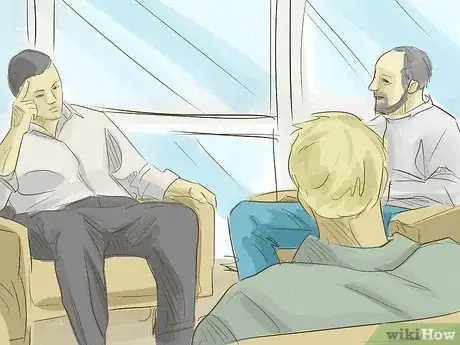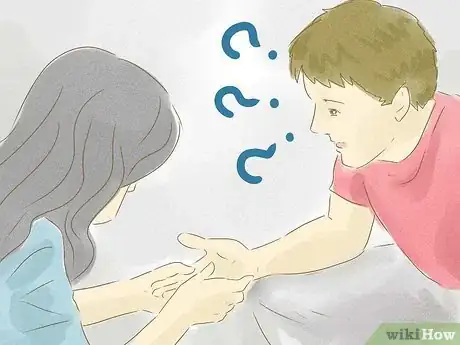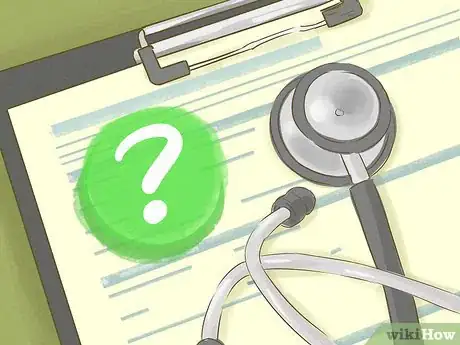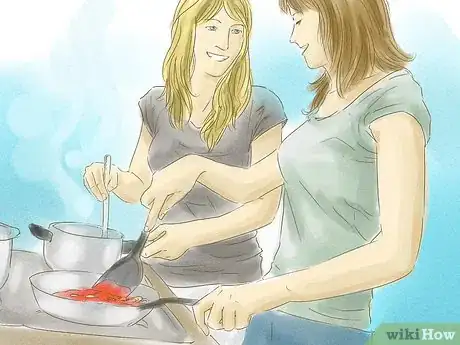This article was co-authored by Moshe Ratson, MFT, PCC. Moshe Ratson is the Executive Director of spiral2grow Marriage & Family Therapy, a coaching and therapy clinic in New York City. Moshe is an International Coach Federation accredited Professional Certified Coach (PCC). He received his MS in Marriage and Family Therapy from Iona College. Moshe is a clinical member of the American Association of Marriage and Family Therapy (AAMFT), and a member of the International Coach Federation (ICF).
There are 8 references cited in this article, which can be found at the bottom of the page.
This article has been viewed 73,330 times.
Parents divorce at all ages. When the parents of adult children divorce the children are faced with different circumstances, dealing with their own grief, dealing with their family and trying to be helpful to the parents. Because you are older you will probably be more involved in this process. Because you are trusted and mature you will probably become a resource for your parents. Keep reading on tips to help you be supportive and helpful during this painful process while managing your own home, family and sanity.
Steps
Communicating
-
1Talk to your parents. Ask questions if you need to better understand.
- If one parent has shared this news you should make sure the other parent is aware of the decision before you say anything.
- It is not your place to inform the other parent.
- You may have to be firm but they should be the one who informs the other parent of their wish to divorce. Don't blame them for not wanting to have the discussion but do not agree to have it for them.
- Realize the decision to tell the children was very difficult and probably a major point in the process.
- Be sensitive. You probably have not lived with them for some time and are not aware of all the issues that have developed
-
2Find out who else is aware of the pending divorce. If your siblings or step-siblings do not know, wait until your parents have had time to discuss it with each of them.
- Make sure your parents inform your other siblings as soon as possible. You don't want them finding out the wrong way from the wrong person. You will need to work on this as a family and that means the family being informed.
Advertisement -
3Talk to your parents, siblings and spouse and try to determine the best time to inform your children of their grandparents' divorce.
- Consider how far you live from your parents, siblings and other relatives. If they are at risk from learning this information from another relative or family friend you should make time to have a family meeting and share the news.
- Explain to your children that you will be helping your parents as much as possible and your attention may be divided.
- Explain that it doesn't change who their grandparents are, they will still be grandmother and grandfather. Encourage them to still speak and interact with them individually.
- Consider the maturity of the child and their closeness to their grandparents.
-
4Discuss the situation with your siblings. Maintain a solid line of communication with them. Agree to discuss things openly and honestly.
- Agree to not take sides but to share information and help each other and your parents get through this tough time.
-
5Discuss the situation with your step-siblings if your parent has remarried. It will be natural for everyone to take the side and look out for the best interest of the birth parent. At least try to be objective and keep the lines of communication open with your step-siblings. Try to be supportive and let them know you are available should they need anything.
Being supportive
-
1Let your parents know that you will be as supportive as you can. However, make it clear that you don't want to feel pressured to take sides.[1]
- Ask your parents to refrain from making disparaging comments about your other parent. However, since you are older and less impressionable, this may not be as big of an issue. You'll need to work this out for yourself.
- Discuss this approach with your siblings.
-
2Keep in mind prior experiences. Remember that previous divorces, especially where there were custody battles, may have made your parents bitter and offensive about the divorce process. They may have experienced divorce as children, and therefore have certain worries and fears about their own divorce based on that childhood experience.[2]
-
3Don't encourage aggressive legal behavior. Ask your siblings to do the same. Ask that everyone remain calm and accepting of what is happening; remind people that this intimate relationship is between two people and as much as all of you might want things to be different, it is inappropriate for any of you to goad your parents into legal spats.
-
4Ask how you can help.
- You may be needed to help sort and move property.
- You may be needed for moral support.
- You and your siblings may need to help a parent arrange for lawn care, help with laundry, etc. if that was something your other parent maintained.
-
5Ask if you and/or your siblings need to attend meetings with attorneys or financial planners.
-
6Suggest that your parents revise their wills, medical powers of attorney, etc. After divorce, the status of these documents changes and they must be updated for the protection of all concerned.
-
7Discuss with your parents any medical wishes or other long term care details that would have previously been the decision of the spouse. Your parents may have avoided that conversation with you since you were the child and assumed the spouse would take care of those arrangements.
- Find out where your parents want to be buried.
- Ask if there are family burial plots that have been purchased. If the divorce will exclude a parent from the plot ask the parent where he/she would like to be buried.
- If either parent has medical problems you should try to attend a doctor's appointment with that parent. Get an understanding of the condition, the medications and make sure the doctor's office changes the next of kin listed on the file.
-
8Discuss holiday plans, events for the grandchildren and other family gatherings with your siblings. Make sure you spend time with each parent and do your best not to exclude the other parent from holiday plans or other events.
- Perhaps move family gatherings to your home or siblings house instead of your parents' home. If you do visit a parent who doesn't cook, offer to cook something there or make it potluck.
- Consider having your mother over for lunch on a holiday and your father over for dinner.
-
9Plan a trip or vacation with one or both of your parents that may allow them to try something new.
Staying sane
-
1Know your limits. As you are very close to the situation and trusted by both, it will be very easy to get sucked in too deep. It's alright to let them vent but make sure you aren't letting a parent's negativity damage your quality of life.[3]
- If a parent becomes too co-dependent, you may need to back away and become less available.
- You may need to declare that the discussion of divorce is off limits for a particular day or event. Encourage them to talk about other things and get their mind off the subject for a while.
-
2Resist taking on a parental role with your parents. Your parents may start confusing your role as a child with a psychologist or attorney. Let them make their own decisions. Offer advice and even suggest professional help but try not to preach or become too involved.[4]
-
3Encourage your parents to get involved with something to distract them. This could be volunteer work or social activities; anything to keep them busy and prevent loneliness.[5]
- Help them find hobbies and activities that involve other older adults with similar interests.
- Encourage them to explore interests they never tried when they were married.
-
4Give yourself space to grieve. Just because you're an adult, doesn't mean you won't feel emotional about this. When your parents break up, memories of the family years together are automatically brought to the fore and it will be hard to face the fact that your parents are no longer together. Take the time to grieve and to process this information as best you can. After all, this is the end of your childhood world, and the loss doesn't go away easily.[6]
Expert Q&A
-
QuestionHow do you deal with your parents' divorce while you're in your 20s?
 Moshe Ratson, MFT, PCCMoshe Ratson is the Executive Director of spiral2grow Marriage & Family Therapy, a coaching and therapy clinic in New York City. Moshe is an International Coach Federation accredited Professional Certified Coach (PCC). He received his MS in Marriage and Family Therapy from Iona College. Moshe is a clinical member of the American Association of Marriage and Family Therapy (AAMFT), and a member of the International Coach Federation (ICF).
Moshe Ratson, MFT, PCCMoshe Ratson is the Executive Director of spiral2grow Marriage & Family Therapy, a coaching and therapy clinic in New York City. Moshe is an International Coach Federation accredited Professional Certified Coach (PCC). He received his MS in Marriage and Family Therapy from Iona College. Moshe is a clinical member of the American Association of Marriage and Family Therapy (AAMFT), and a member of the International Coach Federation (ICF).
Marriage & Family Therapist Idealistically, it helps to understand that your parents separated because of their own issues, and that they have their own challenges they need to experience and face. Don't feel like you need to interfere with the divorce unless it's impacting you in some way—in that case, try to communicate and express how you're feeling.
Idealistically, it helps to understand that your parents separated because of their own issues, and that they have their own challenges they need to experience and face. Don't feel like you need to interfere with the divorce unless it's impacting you in some way—in that case, try to communicate and express how you're feeling.
Expert Interview

Thanks for reading our article! If you'd like to learn more about dating, check out our in-depth interview with Moshe Ratson, MFT, PCC.
References
- ↑ https://www.divorcemag.com/articles/late-life-parental-divorce-how-to-care-for-parents
- ↑ https://www.huffpost.com/entry/when-parents-divorceand-y_b_130244
- ↑ https://www.divorcemag.com/articles/things-you-may-face-as-an-adult-child-of-divorce
- ↑ https://www.chatelaine.com/health/sex-and-relationships/what-to-do-when-your-parents-divorce/
- ↑ https://www.cosmopolitan.com/uk/love-sex/relationships/a13931450/how-to-cope-parents-divorce-adult/
- ↑ https://www.huffpost.com/entry/how-to-handle-divorcing-p_b_294277
- https://www.huffpost.com/entry/how-to-move-on-from-your-grey-divorce_b_5242932
- https://www.nytimes.com/2016/04/24/fashion/weddings/never-too-old-to-hurt-from-parents-divorce.html














































































